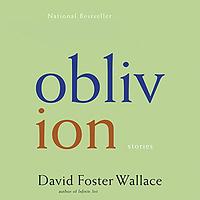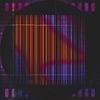Take a photo of a barcode or cover
Much like Infinite Jest, which took me many weeks to reach a halfway giving-up point, Oblivion was difficult, full of non-sequitors and run-on sentences, and completely insane. As seems to be my continuing quibble with DFW, I find the ideas behind his stories compelling, but their execution difficult, and their endings, in this collection, almost uniformly incomprehensible. As a collection of stories about small things that another author might never have thought to devote time to, Oblivion was well-conceived. My favorite story, the namesake "Oblivion," concerned a man whose wife consistently dreams that he snores loudly enough to prevent her from sleeping, creating serious conflict in their marriage. The sidelined action in "Mister Squishy," where an unexplained man climbing conspicuously up the side of a building in which the main action, of an extremely self-aware focus group leader, takes place, was a great and unexpected counterpoint to the dry statistics and stream-of-consciousness. But what actually happens?? To me, the lack of a denouement in each story was frustrating and took something away from the stories; when each one ended, I was left saying "What??!" This felt like laziness to me, not genius.
However, thanks to concepts that kept me turning to my husband going "I'm reading a story about a man who is trying to convince his magazine to run a story about a Midwest guy who makes art out of poop!" I still give it two stars.
However, thanks to concepts that kept me turning to my husband going "I'm reading a story about a man who is trying to convince his magazine to run a story about a Midwest guy who makes art out of poop!" I still give it two stars.
Maybe my expectations were too high, but I loved some details, specially in the last of the stories.
David Foster Wallace's "Oblivion" is a tour de force of narrative exploration and intellectual engagement. The collection, an assemblage of eight diverse, thought-provoking short stories, offers profound insights into the human psyche, tackling themes of reality, consciousness, and the human condition with skill and nuance.
The eponymous ‘Oblivion’ is a genuine triumph of storytelling, seamlessly combining dark humor and tension within its chilling narrative. ‘Good Old Neon’ stands out as an introspective exploration of existential angst that is both haunting and profoundly affecting.
The richness of detail in 'Mister Squishy's' microcosm of focus group marketing exhibits Wallace's keen observations and his knack for breathing life into the ordinary. 'Another Pioneer' is a testament to his unique storytelling, unraveling a sophisticated parable that reflects on human nature and morality.
In 'The Soul is not a Smithy', Wallace skillfully manipulates perspective, delivering a complex narrative through the innocent eyes of a young boy that is nothing short of mesmerizing.
Wallace’s prose is a blend of beautiful complexities and extreme precision. His distinctive narrative voice is filled with honest humor, intellectual depth, and a raw emotional resonance that is utterly captivating.
His incisive examinations, exposing the core of everyday experiences, are a testament to his ability to elevate ordinary circumstances into larger, existential contexts. This ability to connect the mundane and the grand makes "Oblivion" not only intellectually stimulating but also deeply reflective and philosophically engaging.
"Oblivion" is a true testament to why David Foster Wallace is considered one of the most significant writers of his generation. It is a collection that is boundless in its impact, one that continues to resonate and provoke thought long after the last page is turned. Wallace’s "Oblivion" is an absolute must-read for those seeking a cerebral literary experience and a deep, empathetic understanding of the human condition.
The eponymous ‘Oblivion’ is a genuine triumph of storytelling, seamlessly combining dark humor and tension within its chilling narrative. ‘Good Old Neon’ stands out as an introspective exploration of existential angst that is both haunting and profoundly affecting.
The richness of detail in 'Mister Squishy's' microcosm of focus group marketing exhibits Wallace's keen observations and his knack for breathing life into the ordinary. 'Another Pioneer' is a testament to his unique storytelling, unraveling a sophisticated parable that reflects on human nature and morality.
In 'The Soul is not a Smithy', Wallace skillfully manipulates perspective, delivering a complex narrative through the innocent eyes of a young boy that is nothing short of mesmerizing.
Wallace’s prose is a blend of beautiful complexities and extreme precision. His distinctive narrative voice is filled with honest humor, intellectual depth, and a raw emotional resonance that is utterly captivating.
His incisive examinations, exposing the core of everyday experiences, are a testament to his ability to elevate ordinary circumstances into larger, existential contexts. This ability to connect the mundane and the grand makes "Oblivion" not only intellectually stimulating but also deeply reflective and philosophically engaging.
"Oblivion" is a true testament to why David Foster Wallace is considered one of the most significant writers of his generation. It is a collection that is boundless in its impact, one that continues to resonate and provoke thought long after the last page is turned. Wallace’s "Oblivion" is an absolute must-read for those seeking a cerebral literary experience and a deep, empathetic understanding of the human condition.
I think I loved every story but one, although that one story I was rather lukewarm to. But there's so much craft and intelligence and wit and raw emotion...Reading Wallace can occasionally be taxing, but worth it. He was truly a genius, in my opinion. Running out of short stories though...going to have to plunge into the almost bottomless pit that is that behemoth Infinite Jest soon.
There's a moment when you finish one of these stories wherein you might ask yourself "what the hell just happened, in my head?"
Which is to say that this is anything but a collection of bits that fit into neat genres and understandable plots. Instead it's something much better and more original, albeit absurdly hard to parse at points.
There's a comparison to Nabokov on the back cover that might be on, but I'll worry that bit of commentary after I read another DFW collection.
Which is to say that this is anything but a collection of bits that fit into neat genres and understandable plots. Instead it's something much better and more original, albeit absurdly hard to parse at points.
There's a comparison to Nabokov on the back cover that might be on, but I'll worry that bit of commentary after I read another DFW collection.
challenging
dark
slow-paced
Plot or Character Driven:
Character
Strong character development:
Complicated
Loveable characters:
No
Diverse cast of characters:
No
Flaws of characters a main focus:
Yes
The short stories in Oblivion take you into different worlds that can be both banal and tantalizing; clinical or bizarre. Be prepared for a journey that takes you into the deep complexity of the English language.
challenging
dark
emotional
funny
reflective
sad
slow-paced
Plot or Character Driven:
Character
Strong character development:
No
Loveable characters:
Complicated
Diverse cast of characters:
No
Flaws of characters a main focus:
Yes
I read "[b:A Supposedly Fun Thing I'll Never Do Again|6748|A Supposedly Fun Thing I'll Never Do Again Essays and Arguments|David Foster Wallace|http://photo.goodreads.com/books/1165604451s/6748.jpg|574]" and fell in love with DFW's voice. Its unfortunate that the author's suicide is what got me to finally pick up these works, and I felt a little twinge of sadness every time something really resonated with me. I thought he was funny, insightful, and I had never enjoyed reading nonfiction so much.
Unfortunately, I don't enjoy his fiction the same way I love the essays. It is as though without the stern eye of a magazine editor, he gets away with too much. He especially hates paragraph breaks, and it gives me a massive headache every time I turn the page.
I only made it about halfway through.
Unfortunately, I don't enjoy his fiction the same way I love the essays. It is as though without the stern eye of a magazine editor, he gets away with too much. He especially hates paragraph breaks, and it gives me a massive headache every time I turn the page.
I only made it about halfway through.
Except for a few nonfiction pieces, I have now made it through the entire bibliography of David Foster Wallace : -(.
Briefly: "Oblivion" is his final and, I feel, best collection of short stories. If typical short fiction pieces are, say, hand grenades, these are like hydrogen bombs: there is so much imagination, heart, and labyrinthine density.
Each story is uniquely great, but "The Soul Is Not A Smithy" is my favorite, compellingly demonstrating Wallace's gift for character's voice and powerfully vivid descriptions of mental landscapes.
Briefly: "Oblivion" is his final and, I feel, best collection of short stories. If typical short fiction pieces are, say, hand grenades, these are like hydrogen bombs: there is so much imagination, heart, and labyrinthine density.
Each story is uniquely great, but "The Soul Is Not A Smithy" is my favorite, compellingly demonstrating Wallace's gift for character's voice and powerfully vivid descriptions of mental landscapes.




